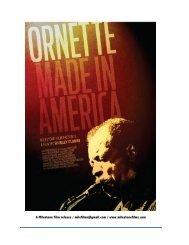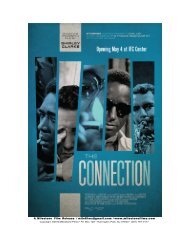ORNETTE Press Kit.8.7.2012 - Shirley Clarke
ORNETTE Press Kit.8.7.2012 - Shirley Clarke
ORNETTE Press Kit.8.7.2012 - Shirley Clarke
Create successful ePaper yourself
Turn your PDF publications into a flip-book with our unique Google optimized e-Paper software.
eschewing tonality and prior structures like bebop and modal jazz while embracing<br />
dissonance, ensemble synchronization and lucid improvisation.<br />
Ornette continues to tour the world and win over acclaim by new generations of musicians<br />
and critics. His music, style and, above all, ideas are still revolutionary to this day. Ornette<br />
Coleman is one of the foremost innovators in 20 th century jazz history. In 1991, Canadian<br />
director David Cronenberg tapped Coleman to perform Howard Shore’s score for Naked<br />
Lunch. The acclaimed film was adapted from the Beat masterpiece by William S. Burroughs,<br />
an acquaintance of Coleman who appears in Ornette: Made in America. In 2004, Coleman<br />
won the prestigious Dorothy and Lillian Gish Prize for “a man or woman who has made an<br />
outstanding contribution to the beauty of the world and to mankind’s enjoyment and<br />
understanding of life.” In 2007 he won a lifetime achievement Grammy award and the<br />
Pulitzer Prize for Music, the first jazz musician to do so. In May 2010 the University of<br />
Michigan bestowed an honorary doctorate on Coleman besides President Barack Obama.<br />
Any interview reveals an unquestionable genius and curious provocateur; his harmolodic<br />
theory crams all the ineffable thoughts in his mind under one umbrella ideology. But there<br />
is an innocent naivety to Coleman that he has freely admitted. When first picking up the Eb<br />
alto saxophone that he taught himself, Coleman misinterpreted the transposing necessary<br />
for his instrument, wherein an ABCDEFG concert scale is not his sax’s standard concert<br />
scale (CDEFGAB is.) Instead of starting from scratch, Coleman took this misunderstanding<br />
in stride, experimenting with standards of tonality that he would eventually raze. Ornette<br />
Coleman is a genius, revolutionary, philosopher, citizen, father, and, above all, a free spirit.<br />
“I didn't need to worry about keys, chords, melody if I had that emotion that brought tears<br />
and laughter to people's hearts.” — Esquire, 2009.<br />
Denardo Coleman<br />
(April 16, 1956 — Present)<br />
The gifted son of Ornette Coleman and Jayne Cortez, Denardo Coleman has furthered his<br />
father’s legacy and created his own with prodigious skill and an innate connection to<br />
harmolodic theory. Starting drums at the age of six, Denardo learned much from his father,<br />
developing from a young age a talent for avant-‐garde jazz.<br />
At only ten years of age, he played drums on Ornette’s 1966 album The Empty Foxhole.<br />
From 1966 to 2006 and every decade in between, Denardo has performed on ten of his<br />
father’s albums and played alongside other respected Coleman collaborators such as James<br />
Blood Ulmer, Jamaaladeen Tacuma and Pat Metheny. As a consistent member of Prime<br />
Time, he has been instrumental in the development of free and funk jazz over the 1970s<br />
and 80s, providing the rhythmic groundwork for Ornette and the rest of the band’s<br />
innovation.<br />
20




